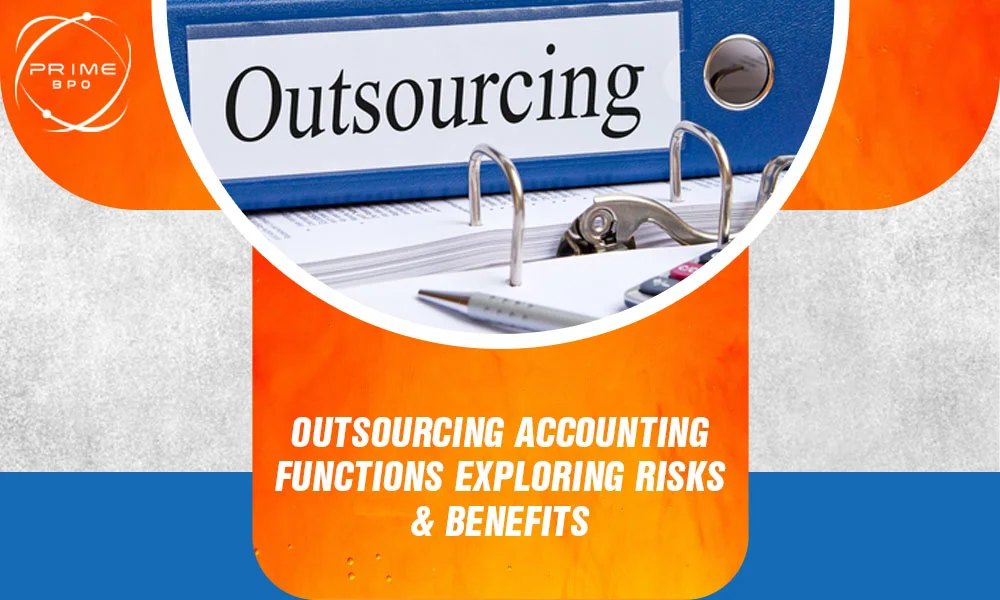Are you spending too much time balancing the books instead of growing your business? Outsourcing accounting functions could be the solution you've been looking for. By handing over tasks like payroll, bookkeeping, and financial analysis to external specialists, companies can focus on their core goals and drive growth. This strategy not only optimizes efficiency but also ensures that seasoned professionals handle financial records. Imagine redirecting your energy from crunching numbers to strategizing for success—how could this change the trajectory of your business?
What is outsourced accounting?
Outsourced accounting goes beyond delegating routine financial tasks; it grants access to a team of skilled professionals versed in accounting standards and technologies, ensuring accurate and compliant financial records. Beyond basic bookkeeping and tax preparation, outsourcing firms offer services like financial analysis, forecasting, and strategic planning, aiding informed decision-making. Scalability and flexibility are additional benefits, allowing businesses to adjust resources as needed without hiring and training new staff. Overall, outsourced accounting provides expertise, efficiency, and strategic support essential for success in today's competitive market.
Get Free Quotes
Customized Options Await
Benefits of outsourcing accounting functions?
1. Savings:
Outsourcing accounting functions can result in substantial cost savings for businesses. By opting for external service providers, companies bypass the expenses involved in recruiting, training, and retaining in-house accounting staff. This not only reduces direct payroll costs but also eliminates the need to invest in additional office space, equipment, and infrastructure. Moreover, outsourcing allows businesses to avoid the overhead expenses associated with employee benefits, such as healthcare, retirement plans and paid Time off. Additionally, by partnering with outsourcing firms, companies can benefit from economies of scale, as these providers spread their operating costs across multiple clients. This means that businesses can access professional accounting services at a fraction of the cost it would take to maintain an in-house team. Overall, outsourcing accounting functions presents a cost-effective solution for businesses looking to optimize their financial operations without breaking the bank.
2. Access Expertise:
External accounting firms often employ highly skilled professionals with specialized knowledge and experience in various aspects of accounting. By outsourcing, businesses gain access to this expertise, ensuring accurate financial reporting and compliance with regulatory requirements. These professionals stay updated on the latest industry trends, regulations, and best practices, providing valuable insights and guidance to their clients. Additionally, outsourcing firms often invest in advanced accounting software and technologies, enhancing the efficiency and accuracy of financial processes. This combination of human expertise and technological innovation allows businesses to navigate complex accounting challenges with confidence.
Moreover, outsourcing providers offer scalability, allowing businesses to adjust their accounting resources according to fluctuating demand and growth. This flexibility ensures that companies can receive tailored accounting solutions that meet their evolving needs without the burden of maintaining an in-house team. Ultimately, partnering with external accounting firms enables businesses to leverage specialized skills, stay compliant, and focus on their core objectives.
3. Save Time:
Outsourcing accounting tasks not only frees up valuable Time for business owners and managers but also allows them to redirect their efforts toward strategic decision-making and core business activities. By offloading time-consuming tasks like data entry, reconciliation, and financial analysis to outsourcing providers, businesses can ensure that these crucial functions are handled efficiently and accurately. This enables management to focus on driving growth, innovation, and building relationships with clients and stakeholders. Moreover, outsourcing providers often leverage advanced technology and expertise to streamline processes, identify cost-saving opportunities, and provide valuable insights into financial performance. With the burden of routine accounting tasks lifted, businesses can seize new opportunities, adapt to market changes, and stay ahead of the competition. Ultimately, outsourcing accounting tasks empowers businesses to maximize their resources, optimize operations, and achieve sustainable success in today's competitive business landscape.
Get Free Quotes
Customized Options Await
4. Improve Productivity:
With routine accounting functions outsourced, internal employees can redirect their energies toward strategic initiatives and creative endeavors that propel business growth and innovation. This shift in focus enables them to explore new opportunities, develop innovative solutions, and enhance customer experiences. Moreover, outsourcing not only streamlines processes but also fosters a culture of efficiency and effectiveness within the organization. By offloading time-consuming administrative tasks to external experts, businesses can optimize resource allocation and maximize ProductivityProductivity. Additionally, outsourcing allows internal teams to collaborate more effectively, leveraging their collective strengths to drive meaningful outcomes. Ultimately, by freeing up internal resources and leveraging external expertise, businesses can unlock new levels of agility, innovation, and competitiveness in today's dynamic marketplace.
5. Scale Up Easily:
Outsourcing enables businesses to tailor their accounting operations to match varying demand and growth spurts. Whether due to seasonal shifts, sudden workload increases, or venturing into new markets, outsourcing providers adjust their services accordingly. This adaptability proves invaluable for businesses navigating unpredictable financial fluctuations. By outsourcing, companies sidestep the need to onboard and train extra staff during busy periods, conserving Time and resources. Moreover, outsourcing firms boast access to skilled professionals who seamlessly integrate into existing workflows. This versatility ensures businesses maintain peak efficiency, no matter the challenges.
Furthermore, outsourcing grants access to specialized expertise, such as tax compliance and financial analysis, which are only sometimes available in-house. Consequently, businesses bolster accuracy and compliance while mitigating risks. In sum, outsourcing's scalability empowers businesses to flex with market shifts and pursue long-term goals with confidence.
6. Automate & Go Digital:
Outsourcing empowers businesses to scale their accounting operations seamlessly, aligning with fluctuating demand and evolving business dynamics. Whether facing seasonal peaks or venturing into new markets, outsourcing providers offer flexibility and agility. They can swiftly adjust their services to accommodate changing requirements, ensuring uninterrupted support during periods of growth or transition. This adaptability is invaluable, allowing businesses to maintain optimal efficiency without the burden of managing staffing levels internally. By partnering with outsourcing experts, organizations can confidently navigate market fluctuations and pursue expansion opportunities with ease.
Risks of Outsourcing Accounting Functions
1. The Role Of Organizational Importance:
Outsourcing critical accounting functions entails entrusting sensitive financial data to external partners, raising valid concerns about data security and confidentiality. Businesses must meticulously assess the sensitivity of their financial information and select outsourcing providers with proven track records in data protection. Robust security measures, such as encryption protocols, secure servers, and stringent access controls, are paramount. Additionally, outsourcing partners should adhere to industry standards and regulations to ensure compliance and mitigate risks of data breaches. By prioritizing security and due diligence in partner selection, businesses can safeguard their financial integrity and reputation.
2. The Failure of the Outsourcing Effort:
Poorly managed outsourcing arrangements can lead to communication breakdowns, service interruptions, and financial reporting inaccuracies. Therefore, fostering open communication, establishing clear expectations, and implementing robust performance monitoring mechanisms are crucial for effectively mitigating these risks.
Get Free Quotes
Customized Options Await
3. Change Management Risk:
Introducing outsourcing into an organization's workflow requires careful change management to address employee concerns, cultural differences, and integration challenges. Proactive communication and stakeholder engagement are key to overcoming resistance and ensuring successful implementation.
4. Loss of Control:
Outsourcing accounting functions involves relinquishing some degree of control over financial processes and decision-making. Businesses must establish robust governance structures, performance metrics, and monitoring mechanisms to maintain oversight and accountability.
Outsourcing accounting functions presents both opportunities and challenges for businesses. By carefully evaluating the risks and benefits and implementing effective management strategies, organizations can leverage outsourcing to enhance efficiency, access expertise, and drive sustainable growth.
Conclusion
Outsourcing accounting functions presents a strategic avenue for businesses to enhance financial efficiency and concentrate on core competencies. While the advantages are enticing, prudent risk mitigation through meticulous planning, communication, and oversight is imperative. By adopting a reasonable approach, businesses stand to reap considerable cost savings, elevate productivity levels, and tap into specialized expertise, culminating in sustained success over the long haul.
However, it's crucial for businesses to remain vigilant and proactive in addressing potential challenges associated with outsourcing. Effective management of outsourcing relationships, clear delineation of responsibilities, and regular performance evaluations are vital components of a successful outsourcing strategy. By embracing these principles, businesses can leverage outsourcing as a powerful tool to optimize financial operations and achieve their strategic objectives in today's dynamic business landscape.
FAQs
Why do companies outsource their accounting functions?
Companies often outsource to reduce costs, improve efficiency, access specialized expertise, and enhance focus on core business activities. It also helps in staying compliant with evolving financial regulations.
What types of accounting functions can be outsourced?
Commonly outsourced accounting functions include daily bookkeeping, financial reporting, tax preparation and filing, accounts payable/receivable management, payroll, and audit support.
How do outsourcing accounting functions affect control over financial processes?
Businesses maintain control over financial decisions and strategic planning while outsourcing routine and specialized tasks. Clear agreements and regular communications ensure that the business's standards and expectations are met.
Is outsourcing accounting functions cost-effective?
Yes, it can be very cost-effective, as it eliminates the need for an in-house accounting department, which involves salaries, benefits, and other employment costs. Outsourcing converts fixed costs into variable costs and often provides access to high-level expertise at a lower cost.






